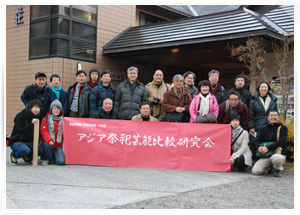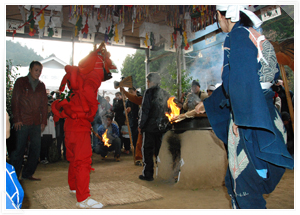

The Shibusawa films held by the Institute for the Study of Japanese Folk Culture(ISJFC) include footage of the Okumikawa Hanamatsuri festival at Nakazai house. Also, under the 21st Century COE Program “Systematization of Nonwritten Cultural Materials for the Study of Human Societies,” the researchers of Group 2, “Arrangement and Systematization of Physical Techniques and Sensibility,” used motion capture to record the movements of the same Hanamatsuri festival at Futto, as well as the Nuo dance (Jiangxi Province, China) and Noh (Kanze school), in an attempt to quantify physical techniques. Based on these existing materials and studies on Japanese and Chinese ritual performing arts at the Institute for the Study of Japanese Folk Culture, we will further advance this work by carrying out comparative studies of ritual performing arts in Asia.
Asian ritual performing arts are characterized by, among other things, their continuing transmission while maintaining rural and magical aspects, and the fusion of these aspects with the variegated performances of actors trained on the ritual ceremonial stage. The main topics of this research project will be the contents of year-end/New Year and Bon rituals and comparison of performing arts enacted on these occasions. Detailed topics will include rituals of villages, temples, and shrines at the turn of the year; the nature of performances as religious offerings on these occasions; associated aspects of Buddhist, Taoism, and shamanistic folk beliefs; the ritual nature of Chinese local drama; magical forms of physical expression such as steps and turns; the divinity of supernatural costumed figures such as the demon and the old man; the genesis of urban dramatic arts; the state of preservation and transmission; and issues related to World Culture Heritage listing.
Together with a core group of Japanese researchers, specialists in the ritual performing arts of regions including Korea, China, and Taiwan will also be involved in the joint project, thus making it possible to lay the foundations for the integrated comparative study of Asian ritual performing arts. It is hoped that this will open the way for study of the history of East Asian performing arts, an area which as yet remains undeveloped.
| Name | Specialty | Affiliation | |
|---|---|---|---|
| PL | NOMURA Shinichi | Asian Ritual Performing Arts | Keio University |
| DL | HIROTA Ritsuko | Chinese folklore | Kanagawa University |
| PM | HOSHINO Hiroshi | Folklore | National Research Institute for Cultural Properties, Tokyo |
| PM | MARUYAMA Hiroshi | Taiwanese Ritual Ceremony Study of Taoism |
University of Tsukuba |
| PM | MINAGAWA Koichi | Ethnomusicology | Kanda University of International Studies |
| PM | OGAWA Naoyuki | Folklore | Kokugakuin University |
| PM | SAIGO Yufuko | The study of Japanese drama | Musashino Art University |
| PM | SASAHARA Ryoji | Folklore | National Museum of Ethnology |
| PM | SUZUKI Masataka | Cultural anthropology | Keio University |
| PM | YOSHINO Akira | Social Anthropology | Tokyo Gakugei University |
| RC | HSIEH Tsung Hui | The study of Taoism | National Taiwan Normal University |
| RC | JOEN Kyung Wook | Folklore | Korea University |
| RC | KIM Yon Gui | Folklore | Chonnam National University |
| RC | LEE Kyung Yup | Folklore | Mokpo National University |
| RC | MA Jian Hua | Folk drama | Fujian Institute of Art |
| RC | TAO Si Yan | Folklore | Southeast University |
| RC | YU Daxi | The study of Nuo Culture | Jiangxi Provincial Federation of Literary and Art Circles |
- PL
- -Project leader
- DL
- -Deputy project leader
- PM
- -Project member
- RC
- -Research cooperator
